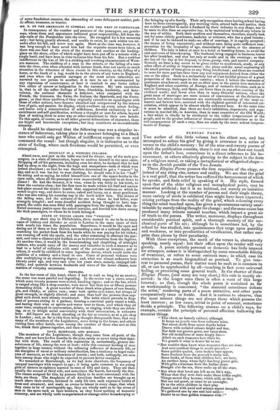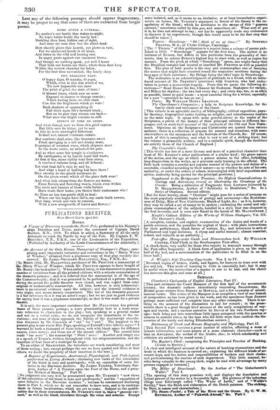ELEGIAC POEMS.
THE author of this little volume lost his eldest son, and has attempted to solace his grief by giving it utterance in a series of verses to the child's memory : tbr of the nine-and-twenty poems of which the publication consists, there is not one that does not touch upon the father's loss, sometimes in a direct reference to his be- reavement, at others allusively glancing to the subject in the form of a religious moral, or taking a metaphorical or allegorical shape— as in the Jewish parable of the Two Jewels.
These Elegiac Poems possess the first requisite of the elegy, or indeed of any thing else, nature and reality. We see that the grief is a real grief; that the writer has suffered the bereavement of which he speaks, and finds relief in speaking of it. His style, formed upon that of the older religious and metaphysical poets, tnay be somewhat artificial; but it is an habitual, not merely an imitative manner. Looking at the number of poems and their single theme, more variety of mode is exhibited than might have been expected; arising perhaps from the reality of the grief, which colouring every thing the mind touched upon, has given a spontaneous variety unat- tainable by merely taking thought forchange : and thesame cause has produced many minute natural touches, which impart a great air of truth to the poems. The writer, moreover, displays throughout considerable poetical spirit, and a thorough mastery of the me- chanical parts of his art ; although he is sometimes led, by the school he has studied, into quaintnesses that verge upon puerility and weakness, or into peculiarities of versification, that rather sur- prise than please by their peculiarity.
With these exceptions, the merit of the verses is, abstractedly speaking, nearly equal: but their effect upon the reader will vary greatly. A poem strictly personal or domestic has little interest for strangers, unless it is distinguished by some remarkable felicity of treatment, or refers to some eminent man ; in which case its attraction is as much biographical as poetical. To give inte- rest to personal poems, their matter must be such as is common to all, or can be apprehended by all—touching in fact some universal feeling, or presenting some general truth. In the shorter of these Elegiac Poems, (and many are very short,) this rule is mostly ob- served: in the longer ones there is often a want of this large interest ; so that, though the whole poem is sustained as far as workmanship is concerned, "the material sometimes defeats the artist," rendering parts of a poem attractive, and other parts comparatively tattle or feeble. And it is curious to observe, that the most minute things are not always those which possess the least interest ; as law cases, trivial in point of amount, sometimes decide a principle. The following stanzas on a child's toys, for example, contain the principle of parental affection hallowing the meanest things.
" This chest, an homely cabinet, although It keeps no jewels won from toilsome mine, Nor rarest shells from ocean depths below Drawn with unfaded colours bright and fine, Nor doth not graven gems, nor vases show, Nor old medallions of some kingly line— Albeit no such treasures here there be, Yet guards it what is dearer far to me.
"But wouldst thou know what treasures thus arc dear, And over costliest things in worth prevail,— Some pebbles quaint, some broken toys appear, Some feathers from the peacock's starry tail, Some books, of those that children love, are here, An earthen lamp, whose light has long grown pale, With gifts a kinsman from the Indian shore Brought o'er the sea, these make up all the store.
" But when that loved one left us on life's way, Whose that they were doth make these trifles ought, Things sacred they became, which still, as they Met our sad quest, or came to us unsought, Or as the other children in their play
Found, and with awed and solemn aspect brought, We gathered one by one and laid aside—
Dearer to us than golden treasures wide ! "
Lett any of the following passages should appear fragmentary, it may be proper to say that some of them are extracted from longer
poems. HOME AFTER A FUNERAL.
No mother's eye beside thee wakes to-night, No taper burns beside thy lonely bed ; Darkling thou best, hidden out of sight, And none are near thee but the silent dead.
How cheerly glows this hearth, yet glows in vain, For we uncheered beside it sit alone, And listen to the wild and beating rain In angry gusts against our casement blown.
And though we nothing speak, yet well I know That both our hearts are there, where thou dost keep Within thy narrow chamber far below, For the first time unwatched, thy lonely sleep.
THE REALIZED PAST.
0 happy days, 0 months, 0 years, Which, even in this dim world of wo, 'Tis now impossible can show The print of grief, the stain of tears !
0 blessed times, which now no more Exposed to chance or change remain ; Which having been, no after stain Can dim the brightness which,ye wore !
Dark shadows of approaching ill Fall thick upon life's forward track ;
But on its past they stream not back—
What once was bright remains so still.
EFFECT OF TIME ON GRIEF.
And what though now we from this grief express But little save its bitter, yet be sure In this its mere unmingled bitterness It shall not, cannot evermore endure.
But comforts shall arise, like fountains sweet
Fresh springing in a salt ancl dreary main, Fountains of sweetest wave, which shipmen meet In the waste ocean, an unlooked-for gain.
And as when some fair temple is o'erthrown By earthquake, or by hostile hand laid waste, At first it lies, stone rudely rent from stone, A confused ruinous heap, and all defaced ; Yet visit that fall'n ruin by and by, And what a band of healing has been there !
How sweetly do the placid sunbeams lie
On the green sward which all the place doth wear!
And what rich odours from the flowers are borne, From Sowers and flowering weeds, which even within The rents and fissures of those walls forlorn Have made their home, yea thence their sustenance win !
So Time no less has gentle skill to heal: When our fair hopes have fall'n, our earth-built towers, How busy, wreck and ruin to conceal, With a new overgrowth of leaves and flowers !



























 Previous page
Previous page